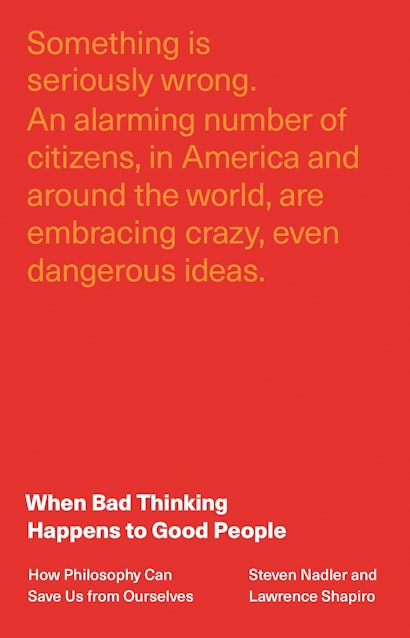When you hear a claim that runs counter to mainstream thinking, like that the Sandy Hook school shooting was a hoax, or that close contact with a person who has been vaccinated against COVID-19 can make you sterile, or that the Holocaust never occurred, what should you think about in order to evaluate the claim? More generally, when faced with an unlikely claim, what must we consider when wondering whether we should believe it? Framed this way, as a question about when we should believe something, when we are justified in believing something, the relevance of my chosen profession—philosophy—becomes immediately obvious.
What can philosophy teach us about what we should believe? Philosophers are trained to think about questions concerning justification. A philosophy student learns various methods for justifying a conclusion and develops skills for assessing the justifications that others offer for claims like those I mentioned above. But one doesn’t need a philosopher to know that evidence of one kind or another is necessary to justify a belief. Believing on the basis of evidence is rational; believing without evidence or even against evidence is (typically) not. But what kind of evidence? How much evidence? Conspiracy theorists might after all offer evidence to justify their conclusions, but does that mean that we should believe their claims?
Here we might look to the history of philosophy for discussions of other attempts to justify unlikely beliefs and to the broader lessons about justification that these discussions impart—lessons applicable to conspiratorial thinking today. Of interest to David Hume, the great eighteenth century Scottish philosopher, were claims that shared with today’s conspiracy theories a high degree of unlikelihood. Hume, a somewhat closeted atheist, had in his sights claims about Biblical miracles. Leaving aside whether believing in miracles is on par with conspiratorial thinking, we can still look to Hume for inspiration regarding how we should weigh the evidence in favor of believing something unlikely. This is just one example of why the study of philosophy—even “old” philosophy—remains important today.
Hume’s insight was that a fixed amount of evidence can in fact provide different amounts of justification for a belief depending on what the belief is about. As simple illustration of this idea, suppose you rely on your six-year-old to learn about the happenings in her first-grade class. Every day she returns home from school and describes for you the day’s events. Her testimony is evidence about what’s going on in school. You might, on occasion, hear from other parents about what their children say and, most of the time, your child’s reports are consistent with those of the other children. Sometimes you hear from the teacher who corroborates, by and large, your daughter’s accounts. You now have a pretty good idea of how reliable your daughter is. You have a reasonable estimate of how much evidential weight to place on what she says. If she tells you that her friend Sophia skinned her knee on the playground today, you believe her. If she says that it was her friend Tim’s birthday today, you again believe her.
Now imagine that one day your child rushes home from school and excitedly reports that a flying saucer had landed in the playground and that the little green aliens who exited the ship stole off with the swing set. Surely your child is mistaken. An alien visitation, if not impossible, is clearly very unlikely. But, and here is Hume’s point, the reason to doubt your daughter is not that she has suddenly become an unreliable witness—we can suppose that she’s reliable as ever—but that the sheer improbability of the day’s events makes the amount of evidence required for rational belief far more than your fairly reliable daughter can provide. Put simply, Hume saw an inverse relationship between the probability of an event and the amount of evidence necessary to justify belief in the event: the more probable or common event, the less evidence necessary for rational belief; the less probable the event, the more you need. “The evidence,” Hume says, “resulting from the testimony, admits of a diminution, greater or less, in proportion as the fact is more or less unusual.”
This lesson, derived from a philosophical analysis of whether we ought to believe in miracles, has clear application to those who choose to believe the outlandish conclusions of conspiracy theories. Just to single out a one such belief, consider again the claim that people who have been vaccinated against COVID-19 can, by shedding the virus, make sterile those in close contact with them. This is incredibly unlikely given what experts tell us about how the vaccine works, how the virus works, and the absence of any confirmed cases of sterility as a result of close contact with a vaccinated person. Perhaps, the conspiracy theorist might urge, the experts are lying. But this too is incredibly unlikely. Such a lie would require the cooperation of thousands of experts, working in thousands of (presumably) independent labs, hospitals, pharmaceutical companies, and so on. What is the chance that not a single member of this vast conspiracy has “come clean” to the vaccine’s pernicious effects? The quality and quantity of evidence that would be required to justify belief in such an unlikely occurrence—an occurrence not quite as improbable but perhaps not much more likely than a miracle or an alien invasion—far exceeds anything a conspiracy theorist has yet to muster.
I have highlighted just one rule for good reasoning that, when properly appreciated, ought to give serious pause to conspiracy theorists. But more importantly, I hope to have made a good case for the value of philosophy in our everyday lives. If we think of a life as consisting in a series of decisions, a good life will be one filled with good decisions. If philosophy can teach us how to make good decisions—decisions about what we should believe—then all the more reason to study philosophy.
Lawrence Shapiro is the Berent Enç Professor of Philosophy at the University of Wisconsin–Madison.

